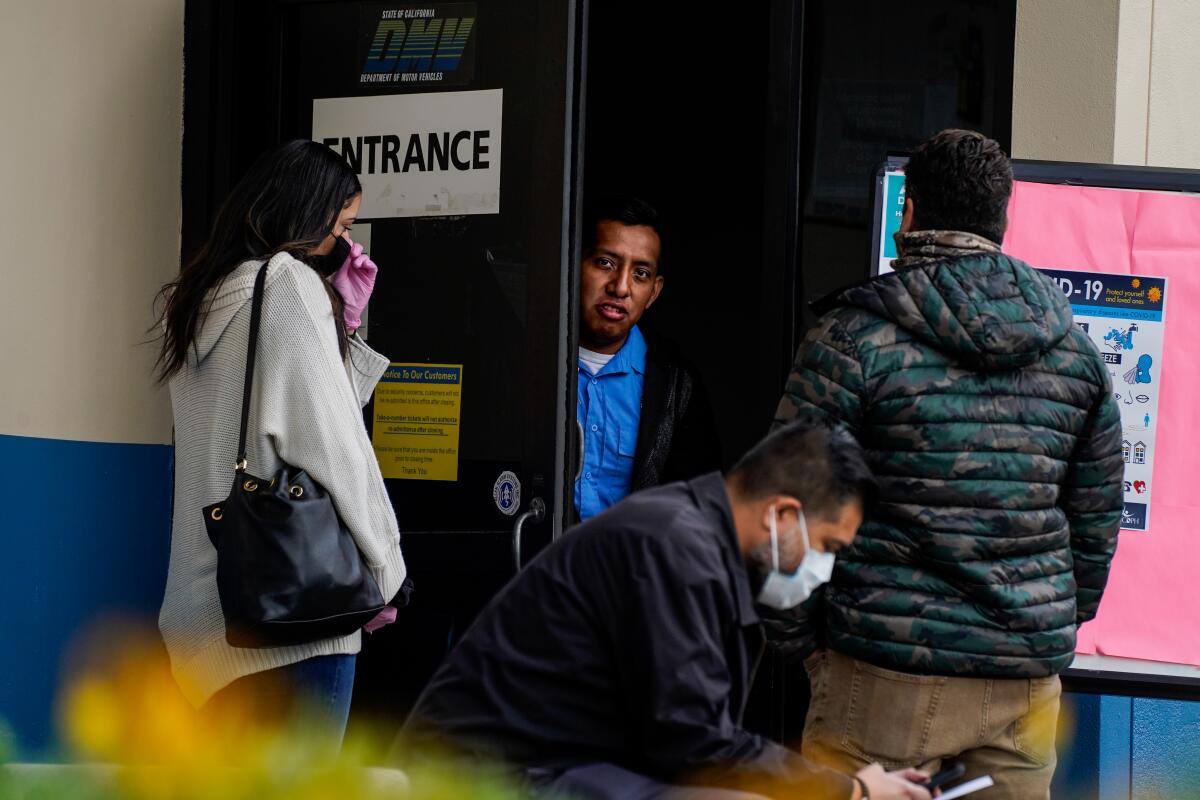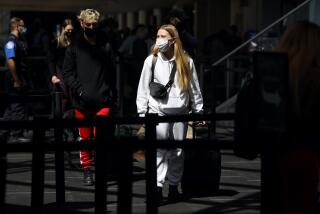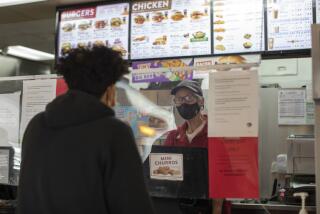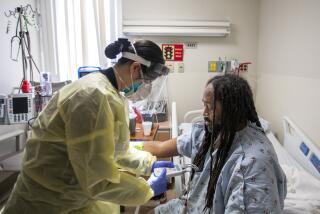Coronavirus spreads among workers at California state agencies, striking fear in employees

- Share via
SACRAMENTO — Two weeks after the California Department of Motor Vehicles closed its field offices to the public in response to the COVID-19 pandemic, the agency’s director sent a memo to employees that confirmed what many of them had suspected.
“There have been DMV team member cases of COVID-19 in multiple offices in the state, including the Sacramento Headquarters building,” DMV Director Steve Gordon wrote in a message to employees April 9, adding that offices were being cleaned and proper authorities notified “as we maximize telework to the extent possible.”
The response to Gordon’s message was “panic,” said one DMV worker, who asked not to be identified because of a lack of approval to speak publicly. Because the DMV has not said where all infected employees were assigned, employees throughout the agency are concerned about which offices may have been exposed, the worker said.
“Everybody just became afraid and wanted to go home and not come back to the building,” the employee said.
Dozens of employees at state agencies, including the DMV, have been infected by COVID-19 in California, raising fear and uncertainty in the workforce as some civil servants say the state has been slow to protect them and has deemed too many services essential, requiring people to stay on the job.
At least 157 state workers, including 11 employees of the California Highway Patrol, have reported they have the virus, according to state officials. But union leaders say the real numbers of infections are higher because the state is tracking only those cases self-reported by employees and says it does not have complete information on how many workers have tested positive.
The confirmed spread of the virus to more than 26,000 Californians has caused many state agencies, including the DMV, to close offices to the public and allow some employees to work from home, yet there are widespread complaints that state government was too slow in moving people to telework.
In cases in which employees are still expected to report to the office, many workers are calling in sick or deciding to use family leave hours so they can stay home to take care of children who are out of school, according to union shop stewards interviewed in multiple state agencies.
For those still at work, there are persistent complaints that workers in contact with the public and in crowded offices have not been given enough personal protective equipment, including masks and gloves, according to representatives of Service Employees International Union Local 1000, which represents 96,000 state workers.
“We appreciate that California state and local officials are working hard to help our citizens stay healthy and stay fed,” said SEIU spokesman Brian Nash, who called the state’s response to employee concerns “inconsistent.”
Andrew LaMar, spokesman for the California Department of Human Resources, said thousands of state employees are working from home, but he did not respond to questions about the availability of masks and other protective gear.
“For jobs that cannot be done via telework, employees have been instructed to abide by social distancing and hygiene guidelines to protect themselves and prevent the spread of coronavirus,” LaMar said.
The consternation over worker safety has been particularly high at the state Department of Motor Vehicles, which Gov. Gavin Newsom once described as “the retail face of government.”
On March 27, the DMV took the dramatic step of closing all 170 of its field offices to the public after some employees tested positive for COVID-19.
The closures happened after the DMV started requiring appointments to visit DMV offices, a change that failed to calm the nerves of employees, including several who spoke to The Times on condition of anonymity. One San Joaquin Valley employee said there was too much close contact with customers, and a San Jose manager had stopped going to work because of health and safety concerns.
The DMV has since shifted to a virtual office system in which many transactions can be conducted online with remote assistance available from employees working in the field offices.
“DMV is making every effort to continue to keep DMV facilities safe from contamination and/or spread of COVID-19 and we need everyone’s support,” Gordon wrote in the email obtained by The Times. “DMV continues to be an essential public service and I appreciate your support and understanding as we continue these efforts.”
Still, numerous headquarters employees were absent from the office a day after Gordon’s memo notifying them of new COVID-19 cases, a worker said.
At the California Department of Social Services branch office in Covina, employee David Jimenez said the agency has been slow to shift people to working from home and provide clear information on options for taking time off.
“In my department, people feel that the state dragged its feet quite a bit,” said Jimenez, an SEIU shop steward who processes disability benefit applications but has recently had to take time off to care for his 20-month-old daughter after her day care closed.
He said the response was slow to employee complaints about a lack of hand sanitizer and insufficient office cleaning.
In an email to employees Monday, one DSS manager said the “earliest delivery date” for hand sanitizer remained April 15, while for wipes, tissues and gloves, it remained April 30. “There is still no guarantee on anything right now per the vendors,” the memo said.
At other agencies, employees are challenging the determination that their work is essential, requiring them to work away from home. That dispute boiled over at the California Lottery, where workers claim the agency took too long to protect workers, including a sales representative who was hospitalized in serious condition because of COVID-19.
“We have lost confidence in lottery leadership to guide the lottery during this global crisis, to protect the workers, to protect the retailers and to protect the public,” said Paulina Vasquez, a sales representative and union shop steward, during the last Lottery Commission telemeeting March 30. “We were left on the front lines too long.”
Vasquez, who said she suffered through COVID-19 symptoms but like many others wasn’t tested, said sales workers who visit retailers were kept on the job too long. They were told they could work from home when Newsom issued his March 19 order for Californians to stay at home to stop the spread of the virus.
Lottery warehouse workers are supposed to remain on the job, she said, even though many blocks of lottery tickets are being returned unsold. On one day last week, only 13 of 21 people assigned to one warehouse were at work, with others taking sick days or other time off, a union official said.
Vasquez questioned the decision of state officials to keep lottery operations going as an officially designated essential service. Lottery Director Alva Johnson responded during the meeting that his agency has worked to improve the safety of employees and accommodated those who needed time off.
“We have been adapting to this crisis and working 24/7 to address the needs of our team members and our communities,” Johnson told the commission. “We have implemented a number of changes, sometimes being amongst the first state agencies to respond.”
He defended the decision to continue lottery operations during the pandemic given that voters required that a large portion of revenue go to education.
“It is [an] essential function to provide funding to California schools,” he said.
Meanwhile, the California Highway Patrol has seen four uniformed officers and seven civilian workers test positive for COVID-19, according to spokeswoman Fran Clader.
Officers have taken steps to protect themselves from exposure, including using masks while on duty and practicing social distancing “as much as possible,” said Carrie Lane, executive director of the California Assn. of Highway Patrolmen, which represents officers.
“The CHP has more than 150 offices from the border of Mexico to the border of Oregon,” Lane said. “As such, it can be challenging to implement sweeping organizational changes quickly and efficiently.”
CHP Commissioner Warren Stanley also closed the CHP Academy last month, sending 177 cadets home.
“I cannot accept the risk that any one of the cadets or staff becomes ill and then be faced with having to quarantine the entire campus,” Stanley said.
The pandemic has also had an effect on the California Legislature, which has reported that one staff member in a district office tested positive for COVID-19 last month. Lawmakers recessed early in response to the virus and had hoped to resume regular work schedules Monday, but they recently canceled most hearings and meetings until May 4 to extend efforts to keep infections down.
Despite the fear of the virus, state workers are making sure important public services continue.
The state Employment Development Department has been flooded with more than 2.7 million new applications for unemployment benefits from people left jobless by the pandemic.
Newsom said Wednesday during his daily public briefing that EDD employees working long hours were given an option to rest Easter Sunday rather than continue to process unemployment claims that day.
“Five hundred of those state employees refused that time off because they care more about you than they did themselves,” Newsom said. “So while many of us may have spent time with our family, they did not.”
More to Read
Sign up for Essential California
The most important California stories and recommendations in your inbox every morning.
You may occasionally receive promotional content from the Los Angeles Times.











